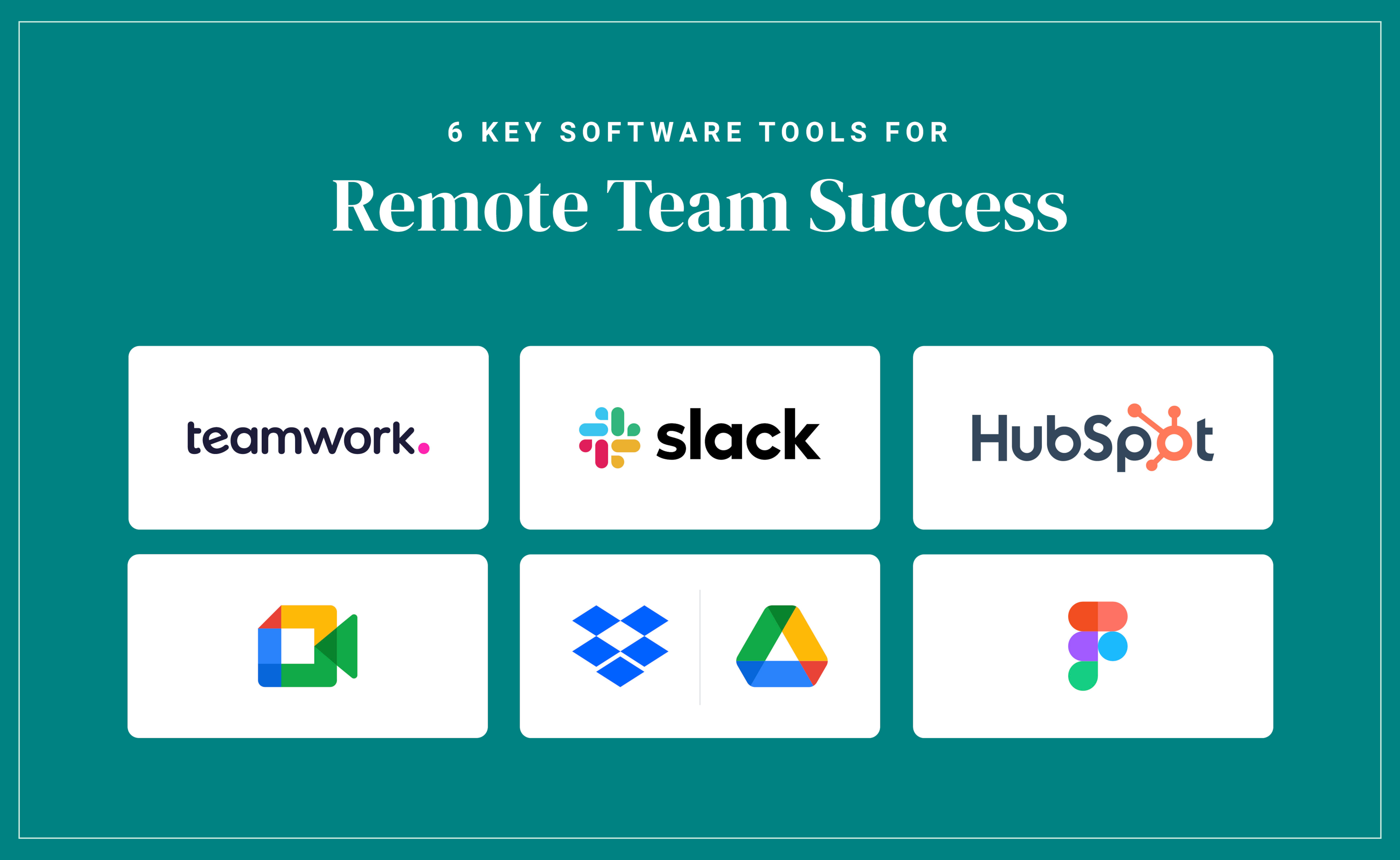Efficiency, Productivity, and Connection: 6 Software Tools for Remote Team Success Going into 2024
Approx 7 min. read

“In this world, nothing is certain besides death and taxes.” After the 2020 pandemic, we suggest Benjamin Franklin add a third: remote work. “The ‘Great Global Work-From-Home Experiment’ created by the COVID-19 pandemic has changed how we work and expect to work far into the future.” (Gallup) Even as people slowly return to the workplace, 70 million Americans remain remote in some capacity.
Buffer, a social media company composed of fully remote employees, has published a report titled “The State of Remote Work” in partnership with other firms for the past 6 years. 3,000 participants who work remotely in some capacity were polled. 98% responded that they want to be remote, correlating with high satisfaction.
These participants also helped identify some of the points of friction tied to remote working: staying motivated, communication difficulties, working across time zones, and feeling connected.
In this muse, we cover: why connection is more important in virtual teams, 6 tools that can help you and your team, plus some insider tips to get the most out of these tools.
Let’s dive in!
Understanding the Challenges: The Remote Work Disconnect
While one aspect of working from home may mean attending a Zoom in a dress shirt and boxers, there are elements of in-person “office life” that emphasize connection in a way that no computer screen can. Team building and inclusion help boost productivity and overall satisfaction making it a vital element in your workspace. In a world where your workspace may look more like a standing desk and a walking pad, establishing meaningful connections within your team and developing a sense of camaraderie is not impossible in the virtual space, it just requires some additional creativity.
Strategies to cultivate connection and engagement in remote teams:
- Regular team communication and check-ins
- Encouraging collaboration and knowledge sharing
- Organizing virtual team-building activities
- Recognizing employee and team achievement facilitated by software tools
How remote teams can prioritize efficiency and productivity:
- Establishing clear goals and expectations
- Implementing effective time management techniques
- Streamlining workflows and processes through the use of administrative tools
The Benefits of a Connected Team
A connected team is more than just a group of individuals working together; it's a cohesive unit that thrives on collaboration, mutual respect, and shared goals. According to Gallup research, teams that are engaged and connected report 21% higher profitability and a 41% reduction in absenteeism.
.jpg?width=648&height=398&name=EVER_Muse_SoftwareTools-RemoteTeams_v1__inline_1%20(1).jpg)
Building a happy, productive team gives a significant competitive edge today. This is important as many industries face skill shortages and competitive labor markets. New research from McKinsey says, employee disengagement and attrition could cost a median-size S&P 500 company between $228 million and $355 million a year in lost productivity. However, the good news is there are a few easy wins and ‘low-hanging fruit’ you and your team can get after.
Team Connection: Why It Pays to Get It Right
Before the rise of remote work, the physical office space naturally fuelled connection. Chatting as the coffee machine brews, passing colleagues in the hallway, and having snacks in the break room is the “norm” in an office. But now, in a virtual environment, the challenge is to recreate that sense of belonging and unity through a screen. Most remote workers know that it’s no easy feat, with connection issues, family life spilling into virtual meetings, and overflowing to-do lists, but it’s definitely worth it when you get it right.
The benefits of building a highly connected team are immense:
- Increased Productivity: Engaged teams show higher levels of productivity and innovation.
- Reduced Turnover: Employees who feel connected are less likely to seek opportunities elsewhere.
- Enhanced Collaboration: A connected team collaborates more effectively, leading to better problem-solving and creativity.
So, how do you achieve team connection in a remote setting?
By leveraging the right systems, tools, and tech for your team.
Leveraging Technology for Team Success
When working in the virtual space, key software tools have helped bridge the gap between a home office and the classic office environment. These tools help unlock efficiency, and productivity and successfully build team connections. Some of the latest and improved software tools help balance productivity and team engagement with the hopes of improving both. Streamlining administrative tasks and breaking down the “distance” barrier helps make space for more employee engagement and enhancement of productivity.
Looking to optimize your remote team’s performance and strengthen bonds and performance? Let's dig into programs such as Teamwork, Slack, Google Suite, Dropbox, HubSpot, and Figma. Let this serve as a virtual toolbox to ratchet up engagement and hammer out some of the kinks you may experience as you develop and/or transition virtual team members.
6 Key Software Tools for Remote Team Success

- Teamwork: Project Management / Time Tracking / Productivity
- Slack: Communication and Collaboration
- Hubspot: CRM, Sales & Marketing Automation
- Google Meet / Zoom / Teams: Virtual Meeting and Conferencing
- Google Drive / Dropbox: Document and File Management
- Figma: Design and Prototyping
1. Teamwork: Project Management / Time Tracking / Productivity
In the realm of project management, Teamwork stands out as a holistic solution tailored for remote teams. We had the opportunity to hear from Peter Coppinger, Founder and CEO at Teamwork at HubSpot's Inbound event. During his insightful presentation, Peter highlighted Teamwork's intuitive interface and its role in facilitating key aspects such as time tracking, task delegation, and overall productivity enhancement. It's not just about managing tasks; it's about aligning the entire team with shared objectives. By centralizing communication and project data, Teamwork ensures that even the most dispersed teams operate as a cohesive unit, keeping everyone informed and engaged.
Insider tip: How to automate recurring tasks with Teamwork:
-
Create or edit a task
-
Set the due date
-
Click the More tab
-
Select Repeats in the dropdown menu
2. Slack: Team Communications and Collaborations
Slack has transformed the landscape of team communication. Beyond just messaging, its channels offer organized spaces for different projects, teams, or topics. Direct messaging allows for quick one-on-one interactions, while its vast array of integrations ensures that all your tools communicate seamlessly within Slack. Whether you're sharing a document, updating a task, or even scheduling a meeting, Slack bridges the gap, making remote communication as effective as face-to-face interactions.
Insider tip: Check out Slack’s message reminder feature where you can set (and snooze) reminders for messages you need to come back to later:
- Click the menu in your Slack message (the three dots at the top right)
- Expand the ‘Remind me about’ section
- Select the time
3. HubSpot: CRM, Sales & Marketing Automation
As an industry leader in CRM, sales, and marketing automation, HubSpot is more than just a tool—it's a game-changer. For businesses that prioritize customer relationships, HubSpot offers an integrated platform that streamlines every touchpoint, from lead generation to customer service. Its sales and marketing modules work in perfect harmony, ensuring that no lead is lost and every customer journey is optimized. A standout feature is HubSpot's new Chat AI, which offers real-time engagement, guiding visitors, answering queries, and even scheduling meetings, all powered by intelligent automation. This new capability has elevated HubSpot from a game-changing tool, to a business’ secret weapon in a world where lean operations are essential for success. As a proud partner, we can attest to HubSpot's transformative impact on business processes and customer relationships.
Insider tip: Oct 2023, HubSpot leveled up even more and released their new AI ChatSpot. You can now ask the chatbot to:
- Complete tasks
- Send out follow-up comms
- Liaise with team members
- Research clients and prospects
This month, our team attended the 2023 HubSpot Inbound event and was surrounded by modern marketers who were die-hard inbound fans pushing the boundaries to take brands to new heights. Read our Muse covering; what makes Inbound so special, and how it's a game-changer for team connection, growth, and bonding.
4. Google Meet/Zoom/Teams: Virtual Meetings and Conferences
The rise of remote work has made virtual meetings an integral part of business operations. Platforms like Google Meet, Zoom, and Microsoft Teams have risen to the challenge, offering features that replicate the in-person meeting experience. From screen sharing to breakout rooms, these platforms ensure that discussions are productive and inclusive. Their robust security features also ensure that your team's conversations remain confidential. In essence, they bridge the physical distance, ensuring that teams can collaborate effectively, irrespective of their geographical locations.

Insider tip: How to avoid the awkward screen share settings during a call:
- Go to your Zoom settings
- Click ‘Share screen’
- Under ‘when I share my screen in a meeting’ click automatically share desktop
Now, when you click the screen share button during a meeting on Zoom, you’ll avoid all the clunky settings, and your screen will just pop up.
5. Google Drive/Dropbox: Document and File Management
In a remote work environment, seamless document and file management is paramount. Google Drive and Dropbox are at the forefront of this, offering cloud-based storage solutions that ensure files are not only stored securely but are also easily accessible. Their collaborative features, like real-time editing and commenting, ensure that teams can work on documents simultaneously, enhancing efficiency and reducing turnaround times.
Insider tip: How to convert documents and files into Google Suite formats:
- Create a fold on your desktop for your files (Excel, Word, PowerPoint)
- In Google Drive, click the gear to open the settings
- Under ‘Uploads’ turn on ‘Convert Uploads’
- Upload your folder to Google Drive
- Go for a walk or take a nap
6. Figma: Design and Prototyping
For teams that live and breathe design, Figma is the chef's kiss. This design and prototyping tool offers a collaborative platform where designers can work together in real-time. Whether it's creating a new design or iterating on feedback, Figma ensures that the creative process is uninterrupted, even when team members are continents apart. Its cloud-based nature means that designs are always up-to-date, and team members can pick up right where they left off, ensuring that creativity flows unhindered
Insider tip: How to copy any website design into Figma:
- Copy the URL of the website you want to take inspiration from
- In Figma click setting, plugins, find more plugins
- Search for ‘html.to.design’
- Paste the URL
- Hit import
- Edit
Unlocking Time for Team-Building and Social Activities
Efficient processes and automation don't just enhance productivity; they unlock valuable time. This time can be invested in team-building activities that further increase connection and camaraderie.

4 popular (stress-free) team-building activities include:
- Virtual Happy Hours: A casual setting for teams to relax and bond.
- Online Games and Pizza Nights: Combining fun with food, a perfect recipe for team bonding.
- Virtual Coffee Chats or Lunch Breaks: Casual chats that recreate the office break room experience.
- Online Team Challenges or Competitions: Healthy competition to boost team spirit and collaboration.
Successfully Onboarding New Tech, Tools, and Initiatives
Successfully integrating new tools and technologies is essential for their effectiveness. Onboarding will be a determining factor in the success or failure of your initiatives, so it shouldn’t be overlooked.
H3: 4 quick tips to help you and your team get started:
- Training Sessions: Ensure that the team is well-versed with the new tools through comprehensive training sessions. They need to see how it will make their lives easier.
- Feedback Loops: Encourage feedback to understand any challenges faced by the team. This starts well before onboarding new initiatives or tools.
- Pilot Runs: Before a full-scale implementation, run pilot tests to identify potential issues.
- Continuous Communication: Offer continuous support and communication to ensure smooth adoption.
Connection Isn’t Impossible in Virtual Teams
The future of work is remote, and the key to remote team success lies in balancing efficiency, productivity, and connection. With the right strategies and tools, teams can not only navigate the challenges of remote work but thrive in this environment. As we move forward, it's essential to continuously evaluate and adapt to ensure that remote teams remain engaged, connected, and productive.
At EverWonder, we’re a fully remote agency that prides ourselves on building a highly connected and creative team. We rely on these 6 tools every day to run our agency and help our team operate efficiently and productively. They also automate mundane admin tasks, freeing up more time in our week to build campaigns and get the best results for our clients.
Related posts
Food for thought.

Connecting Sales & Marketing
by Brian Sena

INBOUND '24 Insights: AI, Brand Building and the Importance of Storytelling
by Conor Ebbs